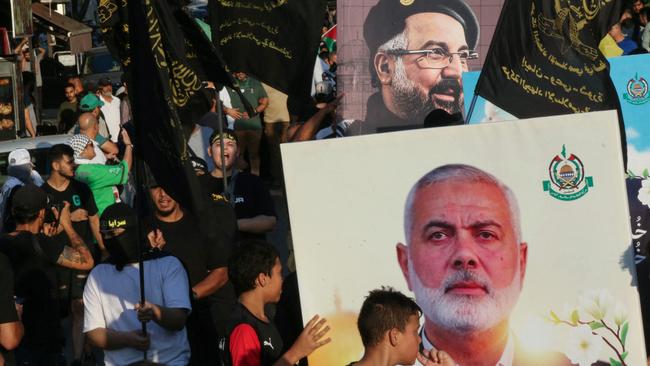Broader regional war rests on judgment of mullahs in Tehran
The brinkmanship Iran is showing in its stated determination to punish Israel militarily injects huge uncertainty and danger.

The risk of war between Israel and Hezbollah in Lebanon is higher now than at any time since the 10-month Israel-Hamas war in Gaza.
Whether this major new front in the conflict erupts in the coming days depends on two very uncertain factors.
Firstly, how provocative will Iran choose to be in its expected attack on Israel and will its response include a direct attack on Israel from Iran’s terror proxy Hezbollah in Lebanon?
And secondly, how far would Israel then go to enact its own retribution for any attack from Hezbollah?
Would Israel be content to launch a series of limited strikes against the terrorist group or would Israel use such an attack as a reason to launch a full-scale and prolonged war against Hezbollah?
US intelligence believes that Iran, most likely with the help of Hezbollah and other terror proxies in Iraq and Syria, has decided to militarily punish Israel for its role in last week’s twin assassinations of Hamas political chief Ismail Haniyeh in Tehran and Hezbollah military chief Fuad Shukr in Beirut.
This could take many forms. It could be a similar style of attack to the one conducted by Iran in April when it launched some 300 missiles and drones against Israel from Iran. The attack was well flagged ahead of time and almost all of these were shot down en route. Or Iran may choose to use its smaller proxy forces in Iraq and Syria or Houthi rebels in Yemen to launch missile attacks against Israel and also US forces in the region.
But by far the most serious and dangerous option by Iran would be to order the heavily armed Hezbollah to launch a major assault from Lebanon. This would be the most dangerous moment yet for Israel given the huge arsenal of missiles and drones which could be fired at the country from close range.
Iran and Hezbollah have carefully avoided such an escalation because they know it would almost certainly invite a massive military response from Israel which, ultimately, would likely cripple Hezbollah.
Both Israel and Hezbollah have played a tit-for-tat game of low level warfare over the past 10 months, lobbing missiles at the other while carefully avoiding all out war.
The question is whether Iran’s calculations have changed and whether the country is now determined to attack Israel on a scale we have not seen previously. This would appear to be unlikely given the costs which Israel could ultimately inflict on both Hezbollah and Iran. But the brinkmanship which Iran is showing in its stated determination to punish Israel militarily for the terrorists’ assassinations injects huge uncertainty and danger into these equations.
Iran is playing with fire in its threat to punish Israel, because Israel’s response is likely to be immediate and powerful.
Although the ruling mullahs in Iran have a strong sense of self-preservation, it doesn’t guarantee that they won’t misjudge the situation and trigger a broader war.




To join the conversation, please log in. Don't have an account? Register
Join the conversation, you are commenting as Logout